-
 Art of Wellness Acupuncture & Traditional Chinese Medicine (TCM)11704 Wilshire Blvd, Suite 295, Los Angeles, CA, 90025
Art of Wellness Acupuncture & Traditional Chinese Medicine (TCM)11704 Wilshire Blvd, Suite 295, Los Angeles, CA, 90025
myartofwellness@gmail.com310-451-5522 Office Hours
MonClosedTue7:30 am --4 pmWed7:30 am --4 pmThu7:30 am -- 4 pmFri7:30 am -- 4 pmSat7:30 am -- 4 pmSunClosedOur office opens from Tuesdays to Saturdays 7:30 am to 4 pm, will be closed on Memorial day, Independent day, Labor day, Thanksgiving day, Christmas and New year.
-
Recent Posts
- Acupuncture and TCM Treatment for Perimenopause Symptoms
- How to Treat Insulin Resistance With Acupuncture and TCM
- How to Treat Metabolic Syndrome With Acupuncture and TCM
- How to Treat Syncope With Acupuncture and TCM
- How to Treat Thoracic Outlet Syndrome With Acupuncture and TCM
- How to Treat Dupuytren’s Contracture With Acupuncture and TCM
- How to Treat Nutcracker Syndrome With Acupuncture and TCM
- How to Treat Rosacea With Acupuncture and TCM
- How to Treat Perioral Dermatitis With Acupuncture and TCM
- Lymphatic Drainage With Acupuncture and TCM
- How to Treat Turf Toe With Acupuncture
- How to Treat Nerve Pain With Acupuncture and TCM
- How to Treat Watery Eyes With Acupuncture and TCM
- How to Treat Ovarian Cysts With Acupuncture and TCM
- How to Treat Dystonia With Acupuncture and TCM
- Can Acupuncture Help Bad Breath?
- Sign up to receive news and updates and get my free report:“The Top 10 Reasons to Try Acupuncture”

October 2025 M T W T F S S 1 2 3 4 5 6 7 8 9 10 11 12 13 14 15 16 17 18 19 20 21 22 23 24 25 26 27 28 29 30 31
Chinese Medicine
How to Treat HIV/AIDS With Acupuncture and TCM
By Qineng Tan, L.Ac.,Ph.D. & Xiaomei Cai, L.Ac., Ph.D.

What does it mean to be HIV positive? HIV is a viral infection that harms the immune system over time and, if untreated, can eventually lead to AIDS, a syndrome that causes people to become weaker and get serious infections easily. There is no cure for HIV/AIDS, but there are various therapies that can slow the progression of HIV. Acupuncture and TCM herbs can help to improve immune function and relieve symptoms related to the side effects of other HIV/AIDS drug therapies.
Human immunodeficiency virus (HIV) is an infection that affects the immune system by destroying the white blood cells (CD4 and T-cells) that are such an important part of the body’s immune response, causing people with HIV to be much more prone to all kinds of infections. Acquired immune deficiency syndrome (AIDS) is the late stage of HIV, in which the CD4 cells have reached a critical low point and other infections are taking hold in the body.
Over a million people in the U.S. are currently living with HIV. Many more people may have HIV and not know it. People can have HIV for several years without feeling any symptoms, while the illness is in its early stages.
HIV is a progressive illness, which affects the functioning of the immune system over a long period of time.
4 Stages of HIV Infection:
- Infection – when a person contracts the HIV virus, it spreads quickly in the body, often causing flu-like symptoms: fever, headache, rash, sore throat. If you have these types of symptoms, and you think you may have had contact with an infected person or a needle recently, it is very important to go get tested for HIV. Early testing allows people to get treatment as soon as possible, and to know if they are contagious and can spread the virus to others.
- Asymptomatic – the HIV virus remains in the body, causing damage to cells and weakening the immune system, while the person may have no symptoms of HIV/AIDS. This latent stage of HIV can last for quite a long time, averaging 8-10 years. This is why many people do not realize they have HIV until they are tested.
- Symptomatic – Eventually, a person with HIV will begin to feel the effects: fatigue, mouth sores from oral candidiasis, diarrhea, and weight loss. Other infectious diseases can easily get into the body because of the weakened immune system; these are called opportunistic infections. Common co-infections associated with HIV include: tuberculosis (TB), cryptococcal meningitis, toxoplasmosis, hepatitis, and pneumonia.
- HIV progression to AIDS – In some cases, people with HIV who receive treatment to help boost their immunity are able to stave off progression into the AIDS stage of illness. However, if the CD4 cell count drops and other infections take hold, a person is considered to have progressed into the AIDS stage.
Being diagnosed with HIV can be emotionally devastating. Knowing you have a serious illness with no cure is naturally going to cause a lot of stress, feelings of anxiety, and even depression. With good health care, it is possible these days to live a long life with HIV. Putting together a team of caring health care professionals who can provide integrative care for HIV/AIDS will help you maintain the best physical and mental health possible. TCM provides holistic care for patients living with HIV or AIDS that works on all levels: keeping your mental outlook positive, helping you sleep better, boosting immune function, and relieving symptoms that are due to side effects of medical treatment, or caused by concurrent infections.
How Do You Get HIV/AIDS?
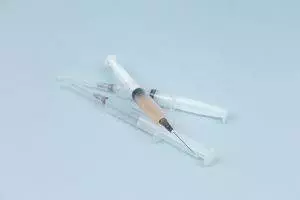
The HIV virus is carried through certain bodily fluids: blood, semen, vaginal secretions, and breastmilk. In order for HIV to be transmitted from one person to another, one of these types of body fluids must have the infection present in it, and must get into the other person’s bloodstream through broken skin or mucous membrane.
HIV is not transmitted through saliva, sweat, urine, or feces, and is not carried in the air in droplets. You cannot get HIV through water or air, or by touching surfaces. The way that HIV is most often passed from person to person is through sexual contact. Other ways you can get HIV are by sharing needles while using drugs, getting a tattoo with a needle that wasn’t properly sanitized, or a blood transfusion. (As a reminder: we only use single-use, disposable, sterile needles for acupuncture treatment.) A woman could also pass HIV to her baby when breastfeeding. Using condoms during sex and only using sterilized needles are the primary ways to prevent HIV infection.
Top 10 Symptoms of HIV
Most people with HIV will go through a long phase of having no noticeable symptoms. Eventually, after the virus has spread slowly, people with HIV will begin to show symptoms such as:
- Fatigue, feeling tired all the time
- Fever, or feeling hot even if you don’t show a fever
- Diarrhea
- Insomnia, night sweats
- Weakness, dizziness
- Weight loss, wasting, loss of appetite
- Nausea
- Skin rash, or purple spots on skin, bruise easily
- Shortness of breath
- Swollen lymph glands
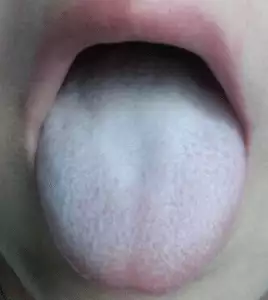
Oral candidiasis, also known as thrush or oral candida, is also common among people living with HIV because the suppressed immune system makes it easier for the fungal infection to take hold. Burning sensation or pain in the mouth cavity and redness with white patches are the signs of oral candidiasis. Long-term use of antifungal medication (Fluconazole) to control thrush can cause side effects and eventually cease to be effective as the body develops a resistance to it.
HIV can also lead to neurological problems, like peripheral neuropathy, in which the signals between the brain and the rest of the body are compromised, causing symptoms like: muscle twitching, loss of balance and coordination, tingling or burning sensations, or numbness.
Medical Treatment for HIV and AIDS
Advances have been made in medical treatment for HIV/AIDS. Different combinations of medications that block the replication of the virus can help to slow the progression of HIV in the body. This type of drug therapy for HIV used to be called HAART, short for “highly active antiretroviral therapy.” Now, it is usually referred to as ART or cART, which stands for “combination antiretroviral therapy.” This form of treatment for HIV can increase chances of survival and quality of life, but is not well-tolerated by all patients. Lifelong use of the medication is required, which, for some, makes HIV a manageable chronic illness. For other patients, the side effects of cART may not be tolerable. Side effects of HIV medications can involve gastric problems, headaches, fatigue, and peripheral neuropathy. Medications can cause liver dysfunction, damage to the liver, and bone marrow suppression, meaning fewer blood cells are being made by the bone marrow.
While a person is still in the asymptomatic phase of HIV, doctors may not begin using antiretroviral therapy because of concerns related to side effects and resistance. However, taking some steps to optimize immune function can potentially help stave off progression into symptomatic and AIDS stages. TCM herbs and acupuncture can be helpful during this phase to help strengthen the immune system and hopefully slow down the progression of disease.
Acupuncture and herbal treatment with TCM may also be used as an adjunct therapy during later phases in order to help people tolerate cART better by reducing nausea and other gastrointestinal effects of the medication and helping to improve appetite. For patients with HIV, TCM treatment is designed to help strengthen the body’s immune defenses in the hopes of preventing advancement to the AIDS stage of disease. For patients in the AIDS stage, TCM treatment focuses on helping to alleviate symptoms of opportunistic infections and to mitigate the side effects of other medications.
TCM for HIV/AIDS

What is HIV from the TCM perspective? TCM puts a lot of emphasis on the prevention of disease by maintaining a balance of yin and yang energies in order to protect the body’s Vital Qi. It is Vital Qi that keeps invasive illnesses like viruses from getting into the body and taking hold there. There are no TCM historical records that point specifically to AIDS, but we do have centuries of practice treating various kinds of invasive viral infections. Modern TCM practitioners apply this knowledge when treating patients with HIV/AIDS.
Syndrome factors of HIV according to TCM:
- Qi deficiency
- Blood deficiency
- Yin deficiency
- Yang deficiency
- Phlegm
- Dampness
- Qi stagnation
- Essence deficiency
An invasion of heat causes the early symptoms of HIV infection: fever, itching (pruritis), and fatigue. Then, later on, as the virus moves deeper into the body, toxic heat causes problems with the organ systems of the stomach, spleen, kidneys, and liver that lead to the weight loss and poor appetite indicative of later stages of HIV and AIDS. Herbal formulations can help relieve the diarrhea that is often reported by patients with AIDS/HIV. Herbs that work to help strengthen the spleen can improve fatigue, shortness of breath, nausea, diarrhea, and skin rash.
Strengthening deficient Qi is central to TCM treatment for HIV and can help to improve immune responses in the body. Chinese herbal formulations can aid in reducing the spread of the infection with results similar to those of cART medicines, while simultaneously having a positive effect on the immune system overall. Herbs do not come with the negative side effects associated with drug therapy for HIV/AIDS.
In addition to the other immune-related problems, people living with HIV/AIDS are also likely to have systemic inflammation. HIV can cause damage and inflammation in the gut, and cause blood clotting, making people more susceptible to cardiovascular problems and heart disease. Acupuncture has been shown to help reduce systemic inflammation in HIV patients. Some studies have suggested that herbs may help AIDS patients to live longer, and improve chances of long-term survival. Treatment of HIV with acupuncture and herbs can help to relieve symptoms and reduce the side effects of other treatments.
Acupuncture Near Me for HIV/AIDS in the Los Angeles Area
If you or someone you love is living with HIV, getting the best care possible as soon as possible is vital for improving the long-term outcome. Putting together a program of complementary health care for HIV/AIDS can help offer the best chances for survival, quality of life, and peace of mind.
*This article is for education from the perspective of Traditional Chinese Medicine only. The education provided by this article is not approved by FDA to diagnose, prevent, treat and cure human diseases. It should not stop you from consulting with your physician for your medical conditions. Traditional Chinese Medicine is based on Qi, which is an invisible force that usually cannot be observed by modern science. Because science focuses on testing ideas about the natural world with evidence obtained through observation, these aspects of acupuncture can’t be studied by science. Therefore acupuncture and Chinese herbs are often not supported by double-blind, randomized trials, and they are considered alternative medicine therapies in the United States.
How to Treat Hepatitis With Acupuncture and TCM
Qineng Tan, L.Ac., Ph.D. & Xiaomei Cai, L.Ac., Ph.D.

Fever, fatigue, abdominal pain, jaundice, dark urine–these are possible signs of Hepatitis infection, although many people infected with Hepatitis show no symptoms. For some people, a Hepatitis B or Hepatitis C infection goes away on its own, but in other cases, it can cause serious liver damage, leading to chronic liver disease. Acupuncture and TCM treatment, including Chinese herbs, offer a way to help improve liver function and reduce symptoms of Hepatitis.
There are several variants of the Hepatitis virus that can cause inflammation of the liver, leading to scarring (liver cirrhosis or liver fibrosis), and in some cases leading to chronic liver problems or liver cancer. Hepatitis B (HBV) and Hep C (HCV) are the types of infection that can lead to long-term illness and even liver failure. It is estimated that over 300 million people worldwide are living with the effects of HBV or HCV infections.
There is a vaccination that offers protection against Hepatitis B and Hepatitis A, but there is no vaccine for Hepatitis types C, D, and E. People who have contracted Hepatitis A or an acute form of HBV are usually told to rest and drink lots of fluids. Medical treatment for chronic Hepatitis that lasts for more than six months usually involves antiviral medications that help slow down the spread of the virus through the body. TCM treatment for Hepatitis with acupuncture and herbs works to improve the function of the liver and related organs (spleen, kidneys, gallbladder) and to strengthen the immune system so that the body can overcome the effects of the Hepatitis virus.
What Causes Hepatitis?
There are currently five different types of Hepatitis infection, referred to as: Hepatitis A, Hepatitis B virus (HBV), Hepatitis C (HCV or Hep C), Hepatitis D, and Hepatitis E.
All of these viral infections affect the liver, causing inflammation and possibly scarring, known as cirrhosis of the liver or fibrosis of the liver.
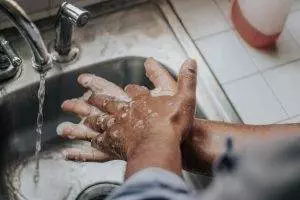
Hepatitis A and E viruses are carried in contaminated water or food supplies. People might contract the Hep A or Hep E virus through eating something like raw shellfish that was in contaminated water, or eating food prepared by a worker who did not wash their hands properly. These variants of Hepatitis may cause an acute infection, but do not lead to chronic conditions.
HBV and HCV are spread through bodily fluids like blood and semen, and can therefore be spread through sexual contact, or the sharing of needles, or a woman may pass the infection to her baby during birth. Hepatitis is a common co-infection in people living with HIV/AIDS. People with Cystic Fibrosis (CF) can also be more prone to infections and liver problems. These more serious forms of Hepatitis can lead to chronic illness, including cancer of the liver, or liver failure, making it one of the primary reasons people end up having a liver transplant.
Autoimmune hepatitis, which has also been called plasma cell hepatitis or lupoid hepatitis, occurs when the immune system mistakenly attacks liver cells.
Top 10 Symptoms of Hepatitis
Symptoms of a HBV or Hepatitis C infection often do not show up for a few weeks, a few months, or in some cases, years later. Some people, especially children, do not feel any symptoms of Hepatitis. The most common Hepatitis symptoms include:
- Abdominal pain, pain in right side
- Swelling in liver area, swollen belly (ascites – fluid buildup in the liver)
- Jaundice, yellow eyes, yellow skin
- Dark urine, pee is dark
- Light colored stools, poop is clay-colored
- Fatigue
- Nausea
- Fever
- Loss of appetite
- Joint pain
Bleeding easily or bruising easily are also potentially signs of Hep C, as is a skin rash, or itchy skin (pruritus), little blisters, or itchy patches of skin like psoriasis. Some people have a sensation of their internal organs itching.
What Is the Treatment for Hepatitis?
If a person shows high levels of liver enzymes and still has the Hepatitis B virus in their body after six months or more, they will often be prescribed medications aimed to slow the spread of the virus and prevent further damage to the liver. There are several types of antiviral medications used to treat patients with long-term effects of Hepatitis, some of them are pills (adefovir, entecavir, lamivudine, telbivudine, tenofovir) that are taken daily for a year, or for several years. Some, known as Interferons, are given as an injection a few times a week over the course of several months or more. These medications can slow the virus in some patients, but for some people, they may not do much to protect the body from liver damage or stop the virus from spreading. These medications can cause serious side effects, including headaches, dizziness, fever, and severe depression. Acupuncture and TCM methods offer an alternative or adjunct support to help promote better liver function and boost the body’s defense against the Hepatitis virus.
What Acupuncture and TCM Can Do for Hepatitis

Hepatitis infection is closely associated with the liver, as it is the liver that shows the most obvious damage as a result of infection, often resulting in cirrhosis or scarring of the liver. But according to TCM philosophy, the other internal organs work in concert with the liver, helping it to do the job of cleaning the blood and supplying it to the rest of the body. Patients with chronic Hepatitis B infection will demonstrate symptoms that help the acupuncture practitioner recognize a particular syndrome pattern, allowing them to use acupuncture points and Chinese herbs to work on deficiencies in the liver and other organs. In TCM theory, Hepatitis infection occurs due to pathogenic forces of toxic Heat and Dampness invading the body. The infection moves through different stages, and the TCM provider will tailor treatment with herbs, acupuncture, and moxibustion to the stage of infection and specific pattern of symptoms.
TCM differentiations of Hepatitis include:
- Liver Qi stagnation – causes symptoms like nausea, poor appetite, distension of the belly or bloated stomach
- Spleen and/or Kidney Yang deficiency – associated with poor appetite, loose stools, sallow complexion, weakness, loss of muscle
- Liver – Gallbladder Dampness and Heat – causes jaundice (yellowing of the eyes and skin), fever, nausea
- Liver – Kidney Yin Deficiency – indicated by headaches, dizziness, irregular periods, stiff joints, poor sleep, irritability, and ringing in the ears (tinnitus)
- Blood stasis – accumulation of blood in the liver contributes to fibrosis or cirrhosis, also causes pain in the lower rib area, menstrual problems, PMS, and depression.
A person may be more susceptible to getting Hepatitis because of some underlying deficiencies in their Qi, and/or the virus may cause those deficiencies to manifest. The main goal of acupuncture treatment for HBV or HCV, therefore, is to strengthen the liver, spleen, and kidneys, to clear any dampness or excess heat from these organs, and to increase the circulation of blood through the systems.
Traditional Chinese herb formulations have been shown in clinical trials to help improve liver function in patients with chronic Hepatitis B.
Herbs that help improve spleen function are believed to help rid the body of the virus and allow for healing of the liver.
Diet and nutrition are, naturally, also very important in helping to strengthen and detoxify the liver and other organs. Your TCM practitioner will go far beyond the usual advice (drink fluids, avoid alcohol), and will give you specific advice for a hepatitis diet plan.
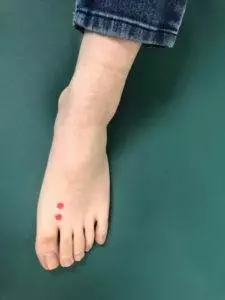
Acupuncture Near Me for Hepatitis in West LA
Chronic Hepatitis B and Hep C infections can be difficult to treat. Using acupuncture and herbs as an adjunct to conventional antiviral therapy for HBV may help to prevent further damage to the liver and improve organ function so that patients can recover from a chronic viral infection more fully. At Art of Wellness, we have over 30 years of experience providing integrative care for those suffering from chronic illnesses of all kinds.
*This article is for education from the perspective of Traditional Chinese Medicine only. The education provided by this article is not approved by FDA to diagnose, prevent, treat and cure human diseases. It should not stop you from consulting with your physician for your medical conditions. Traditional Chinese Medicine is based on Qi, which is an invisible force that usually cannot be observed by modern science. Because science focuses on testing ideas about the natural world with evidence obtained through observation, these aspects of acupuncture can’t be studied by science. Therefore acupuncture and Chinese herbs are often not supported by double-blind, randomized trials, and they are considered alternative medicine therapies in the United States.
How to Treat PMS With Acupuncture and TCM
By Xiaomei Cai, L.Ac., Ph.D. & Qineng Tan, L.Ac., Ph.D.
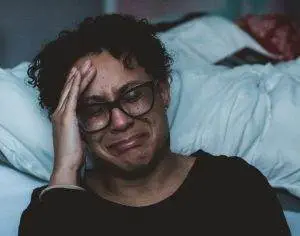
Monthly mood swings, bloated stomach, headaches, and weight gain. Why is PMS so bad? Premenstrual syndrome (PMS) is a set of symptoms that occur in the days before a woman gets her period. PMS symptoms affect every woman differently, and can be serious enough to disrupt your life every month. TCM is an effective way to deal with PMS, because acupuncture treatment can help relieve both physical and emotional symptoms of PMS and severe PMS, also known as PMDD (premenstrual dysphoric disorder).
To say that PMS is common among women is an understatement. The vast majority of women experience some changes in both their mental health and their bodies the week before their period starts. Whether or not a woman feels that it has a negative impact on her daily life may change over time. For some women, PMS isn’t a big deal; for others, it’s a major problem that can affect their relationships, impact their work, and make life hell every month.
Most women find their own particular pattern of PMS is somewhat predictable–until it isn’t. One of the most frustrating aspects of menstrual problems is the sense that things change without warning, and symptoms can come on suddenly with ferocious intensity. It can be difficult to describe how you feel before your period, because the symptoms seem to come and go. Some women find that their PMS symptoms are different from month to month. In some cases, they might find that every other month is bad, while the alternating months aren’t so bad. Why is PMS worse some months?
Other than the basic understanding that PMS is caused by fluctuations in hormones and brain chemistry, conventional medical science does not offer much in the way of clear answers about what causes PMS.
TCM provides a different framework for looking at menstrual problems and has been used to treat women’s health issues of all kinds for many centuries. TCM treatments including acupuncture, acupressure, moxibustion, and Chinese herbs can not only help relieve PMS symptoms, they can also be beneficial for other menstrual problems like irregular periods, PCOS, painful periods, endometriosis, heavy periods, fibroids, and symptoms of perimenopause.
Top 10 Symptoms of PMS
As a syndrome, PMS is considered a collection of symptoms that often appear together, in various combinations in different individuals. In the case of PMS, a woman may feel that her own symptoms change as often as every month, or gradually over the course of years. Girls in their teenage years may experience PMS in one way. Then, a woman in her early adult years may develop a different set of symptoms. After having a baby, a woman may find that her PMS symptoms have changed again. Then, many women in middle age experience changes in PMS symptoms as they go through perimenopause, approaching menopause. The most common signs of premenstrual syndrome include:
- Mood swings, low mood, feelings of sadness or anger
- Anxiety, feeling tense and irritable, cry easily or lose temper, want to be left alone
- Trouble sleeping, insomnia, disturbed sleep
- Breast tenderness, sore breasts, swollen breasts
- Food cravings, changes in appetite
- Weight gain, stomach bloating, water retention, pelvic pressure
- Gassiness, changes in digestion and elimination
- Acne, skin problems
- Changes in libido
- Headaches, migraines, difficulty concentrating, foggy head
Less obvious or well-known symptoms of PMS include: vision problems, tingling in the arms or legs, lack of coordination (clumsiness, dropping things), bruising easily, heart palpitations, dizziness, itchy skin, cold sores, toothaches, back pain, joint pain, and increased TMJ jaw pain.
Other health problems can be amplified during the premenstrual period, such as: chronic fatigue syndrome, fibromyalgia, interstitial cystitis, migraines, IBS, Meniere’s disease (dizziness, vertigo), clinical depression and anxiety disorders.
The physical and emotional aspects of PMS can affect each other, causing the typical mood swings. Feelings of sadness and frustration, or lack of sleep, may lead to comfort eating, but then the sight and sensation of your bloated stomach can cause you to feel depressed about your body. Minor problems with your spouse or co-workers can suddenly seem overwhelming and make you feel angry or helpless.
For some women, PMS symptoms are so bad that they feel unable to function the week before their period. Severe PMS is now diagnosed as PMDD.
What Is PMDD?
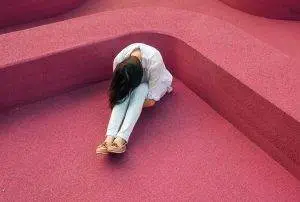
PMDD (premenstrual dysphoric disorder) is a severe form of PMS marked by intense emotional symptoms that dramatically impact a woman’s life, in addition to physical symptoms. “Dysphoria” is the opposite of “euphoria;” in other words, it is a mental state characterized by profound unhappiness and negative feelings. It is estimated that about 5% of all women experience this extreme type of PMS. Signs of PMDD include:
- Severe anxiety, panic attacks, paranoia
- Severe depression, in some cases even suicidal thoughts, lack of self-worth
- Anger and irritability that provokes rage and causes conflicts with other people
- Fatigue, low energy, inability to concentrate, feelings of confusion
- Intense food cravings, possibly leading to binge eating
Again, there is currently no scientific answer for what causes PMDD, although it is generally believed to be related to the way estrogen levels and progesterone levels change between ovulation and the onset of the menstrual period. Mood is considered to be related to serotonin levels in the brain, and this is why PMDD is usually treated with birth control pills, which suppress ovulation, and/or antidepressants (SSRIs), which affect serotonin uptake.
Medical Treatment for PMS
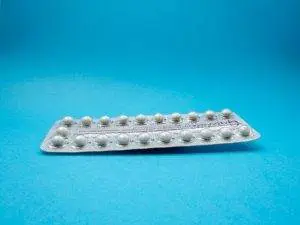
Naturally, when a woman asks for advice about PMS or PMDD, she is going to hear suggestions like: “try meditating, exercise more, eat a healthy diet, and get more sleep.” And it is true that making good lifestyle choices is an important part of helping to reduce PMS symptoms. But women who are suffering with serious PMS need solutions beyond these kinds of lifestyle guidelines.
When women complain of PMS symptoms, doctors will most often recommend OTC pain medications like ibuprofen or acetaminophen (NSAIDs) to relieve pain. Diuretics may be used to relieve bloating or premenstrual weight gain. Of course, most commonly, women are prescribed oral birth control pills, which suppress ovulation, and therefore may reduce the severity of PMS symptoms. More and more frequently, women may be prescribed antidepressants to try to deal with emotional symptoms and mood swings, or anxiety medications to take as needed during PMS. In effect, doctors often treat PMS the same way they would depression or anxiety.
Clearly, birth control pills are not helpful for women who may want to get pregnant, and some women may be concerned about how taking the pill or antidepressants may affect their fertility in the future. None of these pharmacological solutions for PMS address the root cause of the symptoms, and all of these medications carry side effects that may impact a woman’s overall health. Health care for women with TCM seeks to address the deeper internal causes of hormonal imbalances and other problems with the organ systems that are impacting the health of the ovaries and the regularity of the menstrual cycle.
Can Acupuncture Help PMS?

While it is only in recent years that conventional medicine has begun to acknowledge connections between physical health and emotional health, TCM has understood for many hundreds of years that health conditions of all kinds, especially those related to the menstrual cycle, are rooted in the balance of energies. Menstruation represents an ongoing process of transformation that occurs not only within the reproductive organs, but which affects every part of a woman, and even the people around her.
The concept of Yin and Yang in Chinese philosophy describes two opposing yet complementary forces that are constantly acting upon each other in order to achieve balance. The menstrual cycle is very much based on Yin and Yang energies; during the follicular phase of the cycle (before ovulation), Yin is increasing while Yang is decreasing, and in the luteal phase (after ovulation, before the period), Yang is increasing while Yin is decreasing. The system is designed, naturally, to create the right conditions for conception; this process of Yin and Yang exchange is what determines a woman’s fertility.
While the health of the uterus and ovaries is definitely central to the process, within the TCM philosophy, they are not the only organs involved with menstruation. The Kidneys, Liver, and Heart all have important roles to play, as well. In TCM, we also view the elements of Fire–to provide warmth, controlled by the Heart–and Water, controlled by the Kidneys–to provide moisture, as being vital to all processes within the body, especially to menstruation. Blood is cleansed, stored, and then distributed to the other organs by the Liver. Blood being central to the process of menstruation, the Liver’s role is really key in how the whole thing plays out.
According to TCM theory, most PMS and PMDD symptoms are caused by problems with Liver Qi. When the Liver Qi is out of balance, it can lead to feelings of anger, frustration, depression, and irritability. The Liver system is particularly susceptible to negative effects of stress.
There are a few different variations of Liver Qi imbalance and other patterns that can contribute to PMS symptoms:
- Liver Qi invasion – This is a condition of excess, in which there is too much rising Liver Qi, characterized by overall negative emotions that are disruptive, including anger and anxiety, breast tenderness, headaches, dizziness, and constipation.
- Liver Qi depression – In this case, there is not enough Liver Qi, causing feelings of sadness, heaviness in chest, painful swelling of breasts, sighing, bloated stomach, lack of appetite, cramping during period, scanty blood during period.
- Spleen Kidney deficiency – In this case, stagnant energy in the Kidney system is preventing water from moving appropriately, causing water retention or edema.
From the scientific medical standpoint, acupuncture treatment has been shown to have a positive effect on neurotransmitters like serotonin, and to impact levels of estrogen and progesterone. This happens naturally because we are using TCM methods to restore optimal function of all the organs. With Chinese herbs we are able to get specific nutrients into the body that we cannot get from the foods we normally eat.
Acupuncture treatment accompanied with specific herbs for PMS patterns can help balance the liver Qi, and bring all of the organs into synergistic harmony.
In order to make lasting change, it is best to have acupuncture treatment at least once or twice a week. We need to deal with each phase of the menstrual cycle as it occurs by tailoring the acupuncture treatment and herbs to your PMS and period symptoms.
A systematic review of ten controlled trials using acupuncture to treat PMS concluded that TCM treatment of PMS significantly improved symptoms.
Top 3 Tips for PMS Relief From TCM Perspective

There are still a lot of taboos surrounding women’s health, and many girls and women have never learned how to take care of their reproductive health. Working with an experienced TCM doctor will enable you to get personalized care and advice about how to eat the best diet for PMS symptoms, what activities to avoid before your period, and other female hygiene tips that you may not have heard before.
- Nutrition – conventional Western thinking about healthy eating currently focuses on eating fresh, whole foods, which is good, except that people tend to think this means eating a lot of foods raw or cold, as in salads and smoothies. According to the TCM philosophy of nutrition, though, eating cold foods is actually one of the worst things you can do when it comes to relieving PMS and painful periods. Putting a lot of cold food into the stomach cools down the temperature of the other internal organs, which can contribute to more cramping and worse cramps. During the week before your period, concentrate on eating plenty of nourishing, cooked foods like soups and stews, proteins and vegetables, and whole grains like brown rice and quinoa. Avoid too much dairy, sugar, caffeine, hot, spicy or fried foods (that includes chips and crackers), and definitely avoid icy cold beverages and frozen treats.
- Keep track of your period – there are many apps available now to help with this, but it can also be a simple chart with room for notes about your symptoms. Keeping track of your PMS symptoms every month can help you recognize patterns in your own behaviors and experiences. A record of PMS symptoms will also help you communicate what you’re feeling to your health care providers when you are seeking treatment for PMS or PMDD.
- Exercise – gentle movement modalities that move Qi through the body are great to help PMS: Tai Qi, yoga, or dancing are all good. Avoid deep twists that could squeeze or put pressure on the ovaries and other organs. Again, keep track of your exercise routines and how they affect your physical and emotional wellbeing from month to month so that you can see which type of workout is best for you, or if some types of exercise make PMS worse.
Acupuncture Near Me for PMS in Los Angeles, CA
Many women come to us at Art of Wellness seeking help with menstrual problems or fertility issues. We have over 30 years of experience in helping to relieve symptoms of PMS and all types of period pain and dysfunction. It is possible for the menstrual cycle to flow without extreme feelings or strong physical discomfort. If you feel like PMS or PMDD is negatively impacting your life every month, please do not hesitate to give us a call.
*This article is for education from the perspective of Traditional Chinese Medicine only. The education provided by this article is not approved by FDA to diagnose, prevent, treat and cure human diseases. It should not stop you from consulting with your physician for your medical conditions. Traditional Chinese Medicine is based on Qi, which is an invisible force that usually cannot be observed by modern science. Because science focuses on testing ideas about the natural world with evidence obtained through observation, these aspects of acupuncture can’t be studied by science. Therefore acupuncture and Chinese herbs are often not supported by double-blind, randomized trials, and they are considered alternative medicine therapies in the United States.
How to Treat Tennis Elbow With Acupuncture and TCM
By Qineng Tan, L.Ac., Ph.D. & Xiaomei Cai, L.Ac., Ph.D.
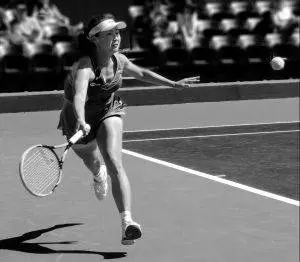
Pain in outer elbow or burning sensation in forearm? Tennis Elbow, also called lateral epicondylitis, is a pain condition caused by overuse or repetitive movements of the arm and wrist. Acupuncture and TCM can provide help with healing the muscles and tendons of the elbow and providing elbow pain relief of tennis elbow, golfer’s elbow, or tendonitis, so you can get back to your usual activities.
“Tennis elbow” gets its name from the fact that many people get this type of repetitive use injury from playing tennis and other sports that involve holding a racquet. But tennis elbow doesn’t only occur in athletes; it’s also common among people who have to perform repetitive movements that tax the muscles and tendons of the elbow, forearm, wrist, and hand and involve gripping an object, such as: painting, hammering and sawing (construction workers), cutting or chopping (cooks, chefs, butchers), using a wrench (plumbers), or working on an assembly line.
Tennis elbow is a kind of tendonitis, or inflammation of the soft tissues of the forearm. Tendonitis occurs when the soft tissues that attach muscles to bones sustain microtears and become inflamed. The major muscle involved in movements where the wrist and hand are gripping an object while the elbow is extending, or straightening, is the extensor carpi radialis brevis (ECRB) muscle. The ECRB muscle experiences friction as it moves over the bumpy joining of three bones in the elbow joint. Over time, and with overuse, the tendons that attach the ECRB to the bones can become torn and/or inflamed.
Tennis elbow pain is usually centered right in the outer side of the elbow, and just below the joint, but it can also radiate further down the arm and into the wrist. There might be a burning sensation in the muscle on the outer forearm. Pain and weakness in the elbow and wrist can make it difficult to perform regular actions like holding a cup or using a computer mouse.
Golfer’s elbow is a similar condition in that it is also an overuse injury that causes weakness and pain in the forearm. The difference is that with golfer’s elbow, also known as medial epicondylitis, the inflammation and microtearing occur in the muscles and tendons involved in flexing the arm rather than extending it, or bending the wrist inward towards the palm with a lot of force or speed. These are located on the inner part of the elbow and forearm. This type of repetitive use condition can be the result of swinging a golf club, throwing a baseball, hitting a forceful spin serve in tennis, but also such activities as shovelling, using a heavy tool like an axe or chainsaw, or even just carrying a heavy suitcase with your hand and wrist wrapped around the handle.
Tennis elbow pain can be resolved with rest, but for many people, complete rest is not a feasible or desirable option. Acupuncture treatment has been shown to help provide significant pain relief for tennis elbow. Acupuncture treatment can help to reduce inflammation and improve blood flow to injured areas to aid and speed healing of various types of tendonitis.
Top 5 Symptoms of Tennis Elbow

Signs of tennis elbow usually develop slowly over time and are not caused by any obvious single injury.
- Elbow pain or pain on the outside of the forearm, burning sensation in the outer part of elbow, stiff elbow
- Pain that radiates down to the wrist, wrist pain, stiff wrist
- Stiffness of the elbow, especially first thing in the morning
- Weak grip strength, reduced grip strength
- More severe pain when gripping an object, like a mug or racquet
Symptoms of golfer’s elbow are similar, except that the pain is located on the inner side of the elbow or forearm, as opposed to the outer side. Pain is more likely to radiate to the fourth and fifth fingers (ring finger and pinky finger) than to the wrist. You may feel pain when making a fist.
Wrist pain, tingling in the fingers, and weak grip strength can also be signs of carpal tunnel syndrome.
Medical Treatment for Tennis Elbow
The standard treatment for Tennis Elbow begins with rest, icing, and non-steroidal anti-inflammatory medications (NSAIDs like Ibuprofen or Acetaminophen) to reduce pain and swelling. If the pain persists, or perhaps if a person is not able to avoid the activities that are causing the inflammation, doctors may recommend wearing a brace and may administer steroid injections.
Surgical treatment for tennis elbow is relatively rare and only recommended in cases where rest and pain management medications are not working. An arthroscopic procedure to remove damaged and scarred tissue can help repair the muscles and tendons, but there is usually a long recovery time after the surgery.
A newer form of treatment for chronic tendon pain and inflammation is the F.A.S.T. procedure (Focused Aspiration of Scar Tissue). This is a less invasive procedure that uses ultrasound imaging and ultrasonic technology to remove tiny bits of damaged tissue without any incisions. Recovery time after this procedure is much shorter than with regular tennis elbow surgery.
While pharmacological treatment for pain may help to reduce immediate suffering, medications like NSAIDs and steroid injections come with significant side effects, even if they aren’t immediately apparent. Using these kinds of medications long-term to alleviate chronic pain can take their toll, sometimes causing gastrointestinal distress, weight gain, sleep problems, and other side effects that have a negative impact on overall health. Acupuncture treatment can act as an analgesic to relieve pain without any negative side effects. In fact, the side effects of acupuncture treatment are usually beneficial, including increased circulation, immune function, and stress relief.
Can Acupuncture Treat Tennis Elbow?
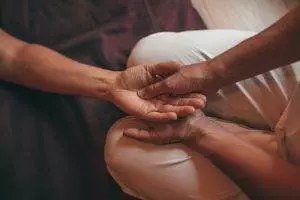
The treatment of chronic pain and inflammation with TCM goes back for many centuries. We use acupuncture and other methods to help relieve pain and reduce inflammation related to shoulder pain, knee pain, hip pain, neck pain, sprained ankle, and foot pain. TCM uses a variety of modalities to treat orthopedic pain conditions, including: acupuncture treatment, electro-acupuncture, moxibustion, cupping, Tui Na massage, exercise, and Chinese herbs in formulations for both internal (tea or pills) and external (pain patches) use. This multi-pronged approach can be very effective for reducing pain in the short term, while helping tissues to heal over time.
A controlled study in which patients suffering from lateral epicondylitis were divided into three groups and treated with either massage or acupuncture, or a combination of both, showed that patients who received the combination treatment experienced, for the most part, a complete recovery after twenty sessions.
Another controlled study that compared people suffering from chronic tennis elbow who were treated with real acupuncture versus sham acupuncture showed that at both the two week mark and the two month mark, people who had received acupuncture reported less pain and improved function of the arm joints.
Exercises and Pressure Points for Tennis Elbow Pain Prevention

If you are already experiencing tennis elbow pain or signs of golfer’s elbow, you may need to take some time off from sports or make accommodations to your work in order to rest the muscles and tendons of the forearm. Resting the arm is important for allowing inflammation to go down. Once you’re able to start exercising again, try these home remedies for tennis elbow that will help to prevent tendon problems in the future:
- To prevent repetitive stress conditions like tennis elbow and golfer’s elbow when playing sports, be sure to always warm up before playing and cool down afterwards. Practice your form, with a trainer if warranted, so that you know your technique is good and not contributing to pain or injury. Check your sports equipment regularly to make sure everything is in good condition and the right size and balance for you.
- Pressure points for tennis elbow: If you are experiencing pain in the elbow and forearm, you might try using this acupressure point to help tennis elbow pain: LI11 (Large Intestine Meridian 11) – located right in the crevice of the elbow crease, applying pressure to this point can help move Qi and blood through the joint and bring relief from tennis elbow pain. This point is also helpful for clearing heat and cooling you down after exercise, so it’s a good one to use right after a game or when you finish work.
- Exercises for Tennis Elbow – practicing gentle exercises that strengthen the muscles of the wrist and forearm can help prevent pain and tissue damage. Using light dumbbells or a flex bar can help with grip strength.
Acupuncture Near Me for Tennis Elbow on the Westside of Los Angeles
Whether you are an avid tennis player, or someone who works hard doing physical labor, elbow pain from lateral epicondylitis can really cramp your style. Athletes and active people of all ages need to take care of their bodies appropriately so as to avoid injuries that can lead to chronic pain. Adding acupuncture to your health regimen is a great way of providing basic maintenance for your body. Acupuncture treatment, therapeutic massage, and a good nutrition program can all help you keep your joints moving smoothly, without pain. At Art of Wellness, we have over 30 years of experience in helping to relieve orthopedic and musculoskeletal pain conditions.
*This article is for education from the perspective of Traditional Chinese Medicine only. The education provided by this article is not approved by FDA to diagnose, prevent, treat and cure human diseases. It should not stop you from consulting with your physician for your medical conditions. Traditional Chinese Medicine is based on Qi, which is an invisible force that usually cannot be observed by modern science. Because science focuses on testing ideas about the natural world with evidence obtained through observation, these aspects of acupuncture can’t be studied by science. Therefore acupuncture and Chinese herbs are often not supported by double-blind, randomized trials, and they are considered alternative medicine therapies in the United States.
How to Treat Toothaches With Acupuncture and TCM
By Qineng Tan, L.Ac., Ph.D. & Xiaomei Cai, L.Ac., Ph.D.
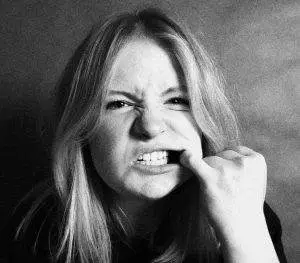
Sharp tooth pain, toothache, or throbbing pain in teeth usually means you need to see the dentist. The pain of dental work often necessitates the use of anesthetics, while post-operative pain from dental surgery is usually treated with over the counter pain medications or opioid painkillers. Acupuncture offers an alternative way of dealing with dental pain and can also relieve the dental anxiety many people experience when they have to have dental work done.
Oral pain makes it hard to eat, hard to talk, hard to even think straight. Mouth pain felt in relation to problems with the teeth, or a hurting tooth, is often nerve pain that may be sharp in one place, or radiate to other parts of your face and head. Acupuncture acts upon the neurotransmitters that carry signals between parts of the body and the brain, helping to block pain sensations and relieving tooth pain.
Different types of mouth pain, not necessarily related to dental problems or the teeth, can also be alleviated by acupuncture, including TMJ jaw pain, clicking or locking of the jaw, tension from grinding teeth, and dry mouth (xerostomia). Myofascial pain, pain in the muscles of the face, and migraines that cause pain in the neck and side of the head can also be helped with acupuncture treatment.
Acupuncture and herbs do not replace the need for regular dental visits or necessary dental procedures. However, TCM methods, used in conjunction with good oral hygiene, can help to promote the development of strong teeth in children, and the maintenance of healthy teeth and gums in adults. TCM treatments help improve immune function, as well, which can help prevent mouth infections.
While dentists have a variety of anesthetics they can use to help reduce pain during dental procedures, many people find the injection of anesthetic to be painful and anxiety-inducing in and of itself. There are definitely downsides to the pain relief offered during dental visits, so much so that many people avoid going to the dentist, or at the very least wish there was some alternative form of anesthesia. Recently, there is growing interest and research to show that acupuncture can be an effective means of providing pain relief before, during, and after dental procedures.
It is estimated that up to 30% of people report feeling dental anxiety, while about 10% of patients experience dental phobia. Acupuncture has been shown to help produce a clinically significant decrease in feelings of anxiety or fear of going to the dentist.
Managing Dental Pain
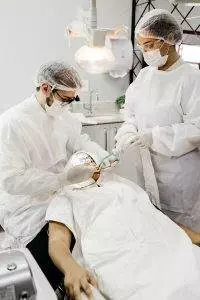
It is common to experience pain while you are waiting to get into the dentist for a toothache caused by a broken filling or because a crown has fallen out. Most dental pain is usually managed with non-steroidal inflammatory drugs (NSAIDs), also known as OTC pain medications like ibuprofen and acetaminophen. However, some people cannot tolerate the regular use of these medicines, as they can cause damage to the lining of the stomach.
Different types of anesthesia used during dental work include:
- local anesthetics (lidocaine, articaine, etc.), which numb the area where a tooth is being worked on
- sedation (nitrous oxide gas, Valium, Versed, etc.), which helps relax the patient
- general anesthesia, which means a patient is rendered unconscious for the duration of the dental procedure
Pain after oral surgery is most often treated with over the counter analgesics like ibuprofen or acetaminophen, but severe dental pain may be treated with opioid painkillers. Dentists in the U.S. are far more likely to prescribe opioid pain medications than they do in other countries. Dentists are also more likely to prescribe long-acting opioids, and to prescribe opioids for a longer period of time. The growing numbers of people addicted to opioids in America is largely due to over-prescription of these drugs. TCM methods like acupuncture can relieve a toothache and reduce post-operative pain and bleeding without side effects or risk of dependence.
Can Acupuncture Help Tooth Pain?
Acupuncture treatment has an analgesic effect, reducing pain and inflammation of all kinds. Acupuncture not only offers natural pain relief for toothache, but can also help reduce bleeding during dental procedures such as tooth extractions.
A controlled study that compared two groups of patients have teeth extracted, one group treated with articaine hydrochloride injections and the other groups treated with acupuncture needles, found that pain relief was comparable between the anesthesia and acupuncture groups, while bleeding was less amongst those patients given acupuncture.
In addition to helping with pain and bleeding during and after a dental procedure, many people find it helpful to come in and have an acupuncture treatment just prior to their dental appointment in order to help alleviate anxiety. Acupuncture may also help to reduce a person’s gag reflex, which can be easily triggered during fittings for orthodontic devices, or impressions.
With acupuncture treatment, we can also effectively treat dental anxiety, allowing for patients to feel more relaxed going into their dental appointment and feel less pain during and after a dental procedure.
Top 3 Pressure Points to Help Tooth Pain
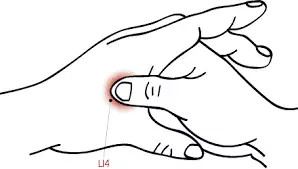
Acupressure has been shown to help reduce anxiety, gag reflex, and the need for dental injections for pain during fittings for prosthetics. Specific points on the head and face, in particular, can help relieve toothache and swelling.
If you are experiencing acute tooth pain, plan to see your dentist as soon as possible. In the meantime, using these acupressure points for toothaches can help you stay calm and alleviate the pain until you can get treatment.
- ST6, Stomach Meridian Point 6, is located in the cheek, equidistant between the corner of the mouth and the earlobe. Apply pressure to the jaw muscle here to help relieve toothache and jaw pain.
- SI18, Small Intestine Meridian Point 18, is right in the cheek hollow, perpendicular to the corner of the eye and outside of the nose. Apply pressure to this point to help relieve tooth pain and swollen gums.
- LI4, Large Intestine Meridian Point 4, is located in the webbing between the thumb and index finger. Squeeze with firm pressure here. Often used to relieve headaches, but this point helps tooth pain, as well.
Acupuncture Near Me for Tooth Pain on the Westside of Los Angeles
No one likes going to the dentist. However, if you have a hurting tooth but you’ve been avoiding the dentist out of fear, or if you know you have to have some major work done, and you are dreading it, please consider scheduling an acupuncture appointment before your next dentist appointment. Discover for yourself how acupuncture can help relieve dental anxiety and post-procedural dental pain. You may find you feel much more relaxed about the whole thing, and herbs and acupuncture can help staunch bleeding and speed recovery after dental work.
*This article is for education from the perspective of Traditional Chinese Medicine only. The education provided by this article is not approved by FDA to diagnose, prevent, treat and cure human diseases. It should not stop you from consulting with your physician for your medical conditions. Traditional Chinese Medicine is based on Qi, which is an invisible force that usually cannot be observed by modern science. Because science focuses on testing ideas about the natural world with evidence obtained through observation, these aspects of acupuncture can’t be studied by science. Therefore acupuncture and Chinese herbs are often not supported by double-blind, randomized trials, and they are considered alternative medicine therapies in the United States.